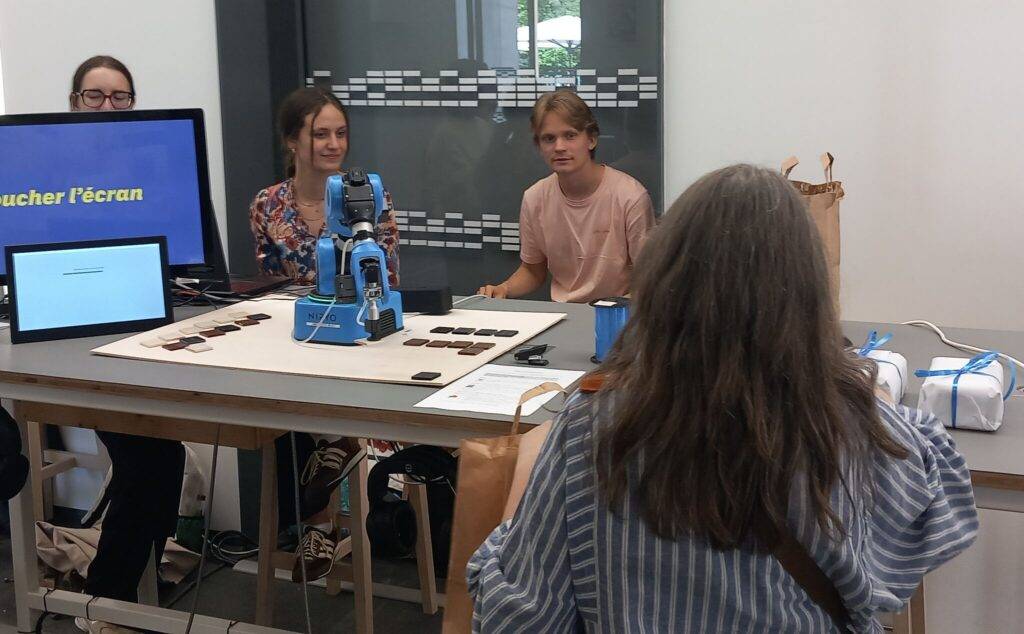Research on the Acceptance of Cobots in Non-Industrial Professional Environments
Higher Education
12 May 2025
At Icam Toulouse, human interactions with collaborative robots (cobots) in non-industrial professional settings are the focus of an interdisciplinary project led by final-year students under the supervision of Simona D’Attanasio, a leading researcher in robotics.
A Human-Centered Design Approach
For the past two years, the research team at Icam Toulouse has been working with students on their final-year project to explore the integration of cobots in professional environments such as craftsmanship, service industries, and administrative roles—areas where adoption remains limited and relatively underexplored.
“Our work focuses on environments where cobots are not yet widely used or studied,” explains Simona D’Attanasio, robotics research lead.
The project is based on a human-centered design approach and explores two types of tasks: coexistence (supervision) and cooperation (joint work without simultaneous action).
The objective is to better understand the challenges related to ergonomics, perceived reliability, and the acceptance of cobots, depending on task type and users’ technological familiarity.
“Our approach puts psychologists and ergonomists in the driver’s seat to guide engineers—so that the system is designed for user acceptance, rather than the other way around,” says Simona D’Attanasio.
Real-Life Simulation in a Fictional Chocolate Factory
A concrete example of this work took place on April 25 at the Quai des Savoirs in Toulouse, where a public demonstration simulated a chocolate factory environment.
Leading the experiment were Matthieu Pohin and Marie Salesses, both second-year Master’s students at Icam Toulouse, alongside three ergonomics students from the University of Jean-Jaurès.
An interdisciplinary team is actively involved in the project, which is funded by the Occitanie Region’s “Human-Centered Robotics” strategic initiative. The team includes roboticists, psychologists, engineers from Icam, and cognitive ergonomics specialists from the ECIT-FH Master’s program at the University of Jean-Jaurès (Cognitive Ergonomics, Technological Innovation and Human Factors).
Together, they designed a simulation where volunteer participants interacted for 10 minutes with a cobot performing a chocolate boxing task.

Assessing Familiarity, Acceptance, and Perceived Reliability
“We first developed a testing protocol using an observation grid, based on three scenarios: one without any errors, one with an error, and one with an error that included a recovery strategy,” says Matthieu.
“Our goal was to test this with a wide range of users with different levels of technological familiarity,” he adds.
“We assessed their interaction with the cobot, using visual cues or tactile feedback, such as a vibrating watch. We studied how users perceived these signals, how familiar they felt with the system, their level of acceptance, and their perception of reliability,” explains Marie.
“The error scenarios allowed us to observe user reactions and better understand the impact of human factors,” she adds.
Toward the Adoption of Cobots to Assist Humans
“The interaction system is highly modular so that components can be easily added or removed based on ergonomic recommendations,” notes Simona D’Attanasio.
This first experimental phase at the Quai des Savoirs was followed by a second session at the University of Jean-Jaurès on May 7. “The goal was to collect even more data—allowing us to fine-tune certain technological aspects and enabling the ergonomists to validate their hypotheses,” say the students.
At Icam, the expected outcomes of this research aim to enhance interaction design and promote the adoption of cobots across various professional sectors—supporting human workers rather than replacing them.
Discover media coverage of the project:
– the article from La Dépêche du Midi
– the article from L’Opinion Indépendant
– the report by France 3 :